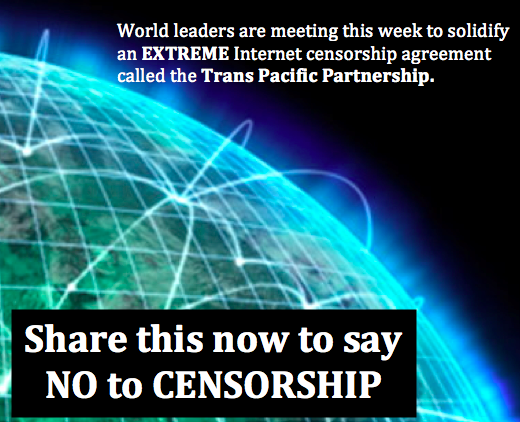 Have you heard about the Trans-Pacific Partnership Agreement? If not, it’s time you learn what it’s all about. The Trans-Pacific Partnership (TPP) is a secretive, multi-national trade agreement that threatens to extend restrictive intellectual property (IP) laws across the globe and rewrite international rules on its enforcement. The main problems are two-fold according to EFF:
Have you heard about the Trans-Pacific Partnership Agreement? If not, it’s time you learn what it’s all about. The Trans-Pacific Partnership (TPP) is a secretive, multi-national trade agreement that threatens to extend restrictive intellectual property (IP) laws across the globe and rewrite international rules on its enforcement. The main problems are two-fold according to EFF:

|
| Where Obama stands on the Trans-Pacific Partnership Agreement |
|---|
(1) IP chapter: Leaked draft texts of the agreement show that the IP chapter would have extensive negative ramifications for users’ freedom of speech, right to privacy and due process, and hinder peoples’ abilities to innovate.
(2) Lack of transparency: The entire process has shut out multi-stakeholder participation and is shrouded in secrecy.
The twelve nations currently negotiating the TPP are the US, Japan, Australia, Peru, Malaysia, Vietnam, New Zealand, Chile, Singapore, Canada, Mexico, and Brunei Darussalam. The TPP contains a chapter on intellectual property covering copyright, trademarks, patents and perhaps, geographical indications. Since the draft text of the agreement has never been offically released to the public, we know from leaked documents, such as the February 2011 draft US TPP IP Rights Chapter [PDF], that US negotiators are pushing for the adoption of copyright measures far more restrictive than currently required by international treaties, including the controversial Anti-Counterfeiting Trade Agreement (ACTA).
What does the TPP mean for you? If write a blog, or post a quote of an article to social media, using a snippet of copyrighted content, you will be liable for copyright infringement, even if you give proper credit to the copyright holder, and only use a snippet. Basically any ‘online rights’ you have will be gone if this is ratified.
Remember ACTA, SOPA and PIPA? TPP is that on steroids. I’m not a fan of Wikileaks, but they do deserve credit for leaking these documents. They show exactly where every country, including the US (under the Obama regime) stands under TPP.